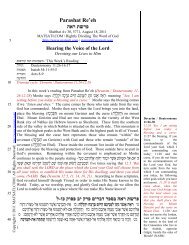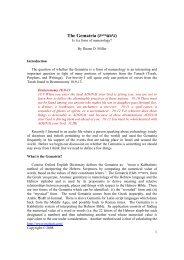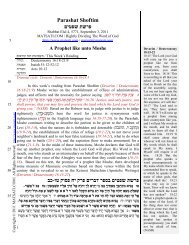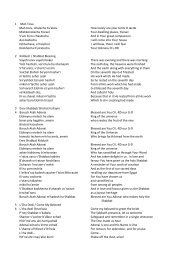Tehillim 3-Part1-Part2 - MATSATI.COM Ministry
Tehillim 3-Part1-Part2 - MATSATI.COM Ministry
Tehillim 3-Part1-Part2 - MATSATI.COM Ministry
You also want an ePaper? Increase the reach of your titles
YUMPU automatically turns print PDFs into web optimized ePapers that Google loves.
David is confident that the Lord will do as He has promised. The reason for David’s confidence is found in<br />
the same verse, God had already stricken his enemies ( :ָתּ ְרַבִּשׁ םיִעָשׁ ְר יֵנִּשׁ יִחֶל יַבְיֹ א-לָכּ-תֶא ָתיִכִּה-יִכּ) and shattered<br />
the teeth of the wicked. David seems to indicate that even in the midst of his troubles, God has already<br />
won the battle, this is why he has had a calm and refreshing sleep. The enemy is not capable of biting him<br />
because the Lord God has broken off the teeth of the enemy, they are no longer able to bite. The Lord is His<br />
salvation and His blessing is upon His people ( ךֶָתָכ ְרִב ךְָמַּע-לַע הָעוּשְׁיַה הָוֹ היַל).<br />
Rabbinic Commentary<br />
The Midrash on <strong>Tehillim</strong> / Psalms 3 has 7 parts. Reading through this week’s Midrash we will be<br />
looking at Part 1. Let’s begin by outlining Midrash <strong>Tehillim</strong> Chapter 3 Part 1.<br />
12<br />
Outline of Midrash <strong>Tehillim</strong> / Psalms, Chapter 3, Part 1<br />
• The Midrash introduces the Psalm as a Psalm of David when he fled from Absalom his Son.<br />
• The ליחתמה רוביד (Dibur Hamathil) “the beginning word” is the “Psalm of David.”<br />
• The אתחיתפ (Petihta) “the homiletic introduction” to the Midrash is the phrase “it is written or the<br />
verse, it is a joy to the righteous to do judgement” (טפשמ תושע קידצל החמש בותכה) taken from<br />
Mishely / Proverbs 21:15.<br />
• The לשמ (mashal) “the parable” is the question of what this verse may mean in light of the verse,<br />
“when He who executes judgement, it is a joy to the Righteous One of the world.”<br />
• The לשמנ (Nimshal) “expansion on the parable” is that The Lord of hosts is exalted through judgement<br />
and that judgment is a joy to the righteous.<br />
• The Concluding statements is to look at the life of David, as soon as God’s judgment come upon him<br />
David began to rejoice and compose a Psalm.<br />
Midrash <strong>Tehillim</strong>, Chapter 3, Part 1 is short enough to included in this week’s study (shown below) and<br />
was chosen because there are a number of interesting points that can be made concerning the comments the<br />
rabbis are giving on the verse “a Psalm of David when he fled from Absalom his son.” The ליחתמה רוביד<br />
(Dibur Hamathil) “the beginning word” directs our attention to the “Psalm” or “Song” (רומזמ) of David.<br />
The אתחיתפ (Petihta) “the homiletic introduction” to the Midrash is taken from Mishley / Proverbs 21:15<br />
that states “it is a joy to the righteous to do judgment” (טפשמ תושע קידצל החמש). It is a little difficult to<br />
establish the לשמ (mashal) “the parable” the rabbis are using in part 1 but it appears that they are trying to<br />
explain the Petihta of what this verse may mean in relation to the opening verse “a song of David when he<br />
fled from Absalom.” The לשמנ (Nimshal) “expansion on the parable” is that The Lord of hosts is exalted<br />
through judgement and that judgment is a joy to the righteous and Part 1 concludes with directing our attention<br />
back to David and the םיקדצ השעמ (maasei tzedikim) “the works of righteousness” he did when judgment<br />
come upon him and his family as a result of his previous sin. The most interesting things to discuss<br />
come out of the לשמנ (Nimshal) expansive sections of this Midrash.<br />
Copyright © 2012 <strong>MATSATI</strong>.<strong>COM</strong> <strong>Ministry</strong>







